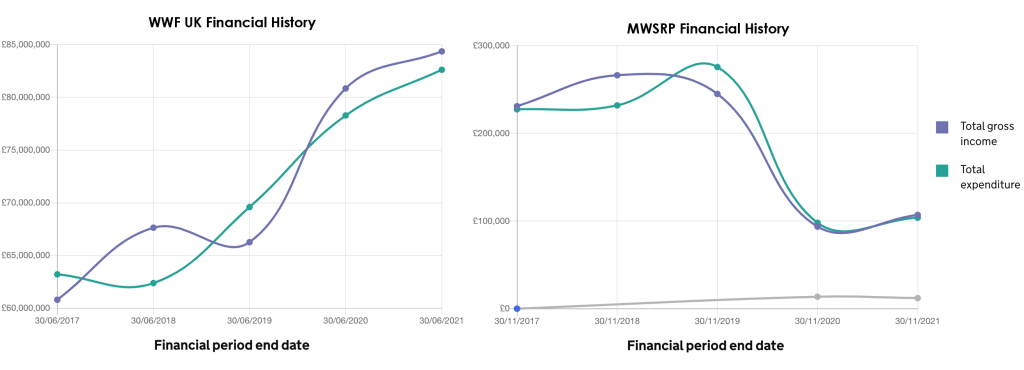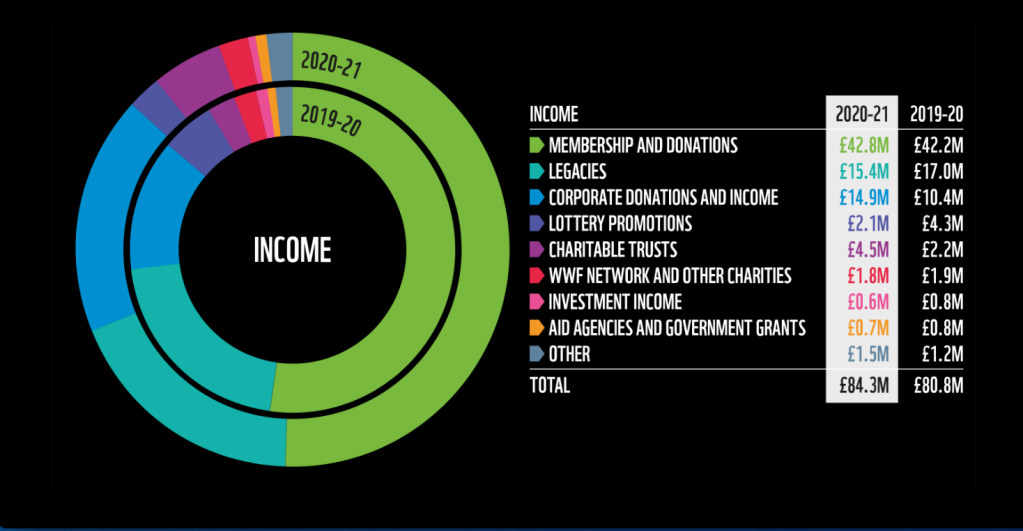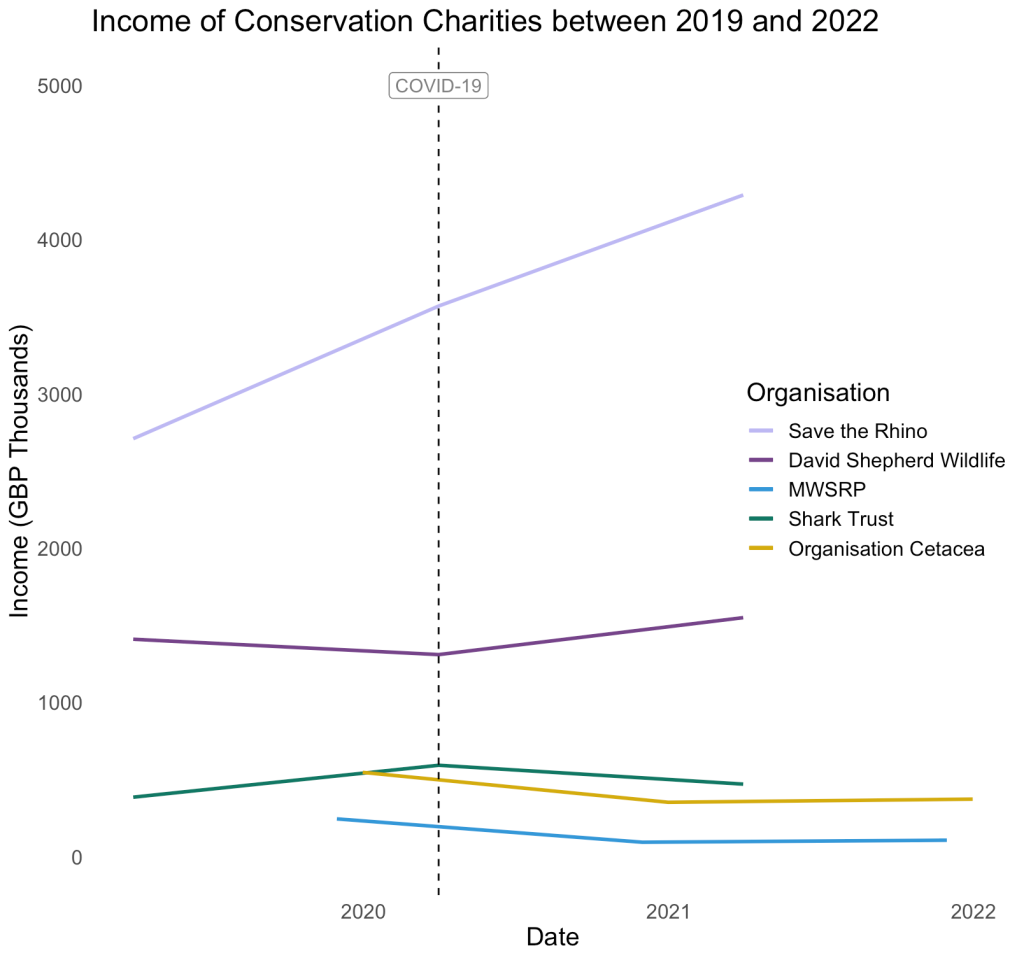In March 2020, COVID-19 brought the entire world to a halt. This, unfortunately, caused many conservation charities to cease their missions, despite the ongoing threat to the environment. In all sectors, there were organizations, such as Zoom, that rose with the tide and others that sank. Whether you take the recession on the horizon into consideration [1] or put it out of your mind, the charities that survived will need to change.
The charities that emerged out of the ash fall loosely into two categories: those that adapted to a new way of doing business and are now stronger for it and those that are barely afloat. The smaller organisations, particularly, belong to the latter category. The difference can clearly be seen when you compare the total gross income of the World Wide Fund – UK (WWF UK) and the Maldives Whale Shark Research Programme (MWSRP). While WWF had a 22% increase in income from July 2019 to July 2020 and a 4.35% increase in income from July 2020 and July 2021 [2], MWSRP had a 61.79% decrease from November 2019 to November 2020 [3], the periods pertaining most to the financial impacts of COVID-19. It is easy to look at these graphs as numbers on a page; however, this 61% reduction in income caused an entire company to come to a halt, with many employees having to find other jobs. Even one year of low income severely reduces a company’s ability to function, with most of the smaller organisations matching their income and expenditure, having no savings to fall back on.

The differences in performance are a result of what each organisation uses as its primary sources of income. MWSRP relies heavily on donations made through its volunteers, who come to the Maldives and help collect data. WWF, on the other hand, makes most of its money through memberships and donations [4]. This split of income for WWF can further be seen in the graph below. While MWSRP’s existence was threatened when COVID-19 froze tourism, WWF’s income over the year actually increased. This shows WWF’s sources of income to be very resilient to both the impacts of the financial markets and global crises.

If this drastic loss in income was limited to only MWSRP, I would be asking, what did they do wrong? But this was not the case. The figure below shows a representative selection of conservation charities registered in the UK. In this graph, it is evident the larger organisations, with greater incomes, performed much better during and after COVID-19 than the smaller organisations, which are even now still recovering. This data reaffirms the notion set by the comparison between WWF and MWSRP: smaller conservation charities struggle much more during periods of crises.

So why should you care?
Lots of these smaller charities take on extremely specific responsibilities. From monitoring immature whale sharks in one of the only locations where they are spotted all year round, to protecting whales, dolphins and porpoises in both UK and European waters. These organisations take on many key tasks that are otherwise ignored and monitor and advocate for species and ecosystems all around the world. Without them, our awareness of the threats these environments face would be severely limited.
Who should help them? How?
The starting point for helping these charities is to look at how they can help themselves. How can they improve their business model so that, like larger organisations, they are more resilient? One successful tool adopted by all the larger organisations I examined is the ability to “adopt an animal”. These memberships provide a constant source of income for these organisations and are something that none of MWSRP, the Shark Trust, or Organisation Cetacea currently offer. Other techniques used by the larger charities include formal fundraising, the sale of art, and even a lottery. To bridge the gap, these smaller charities must become more business-minded and start to offer a wider range of products, instead of relying solely on generous donations.
While the setup of some of these products is cost-intensive, one tool that could help these organisations is group fundraising: networking together, even with the help of a larger organisation, to host an event that can provide the funds they need to get going. In the case this is not possible, the donation of time from people in other fields could be incredibly useful in laying the groundwork for any future projects. There are also lower-cost digital products such as photography, NFTs, and other forms of digital art that could be very worthwhile projects for these charities.
This approach may come across as incredibly capitalistic; however, as things stand, there is no alternative. These companies need to be able to advance their missions, as what they are doing is pivotal to the biosphere. I do not have the answers to these charities’ struggles, but I know these organisations need to look to the future and increase their outreach. They must figure out how to not only survive but thrive and better serve the environments they are protecting. How might your time or ideas help these conservation charities adopt innovative technologies and grow?
References
- Johnson, J. (2022). Are we in a recession? Maybe not officially, but there’s growing concern that one’s on the horizon. [online] Business Insider. Available at: https://www.businessinsider.com/personal-finance/are-we-in-a-recession?r=US&IR=T [Accessed 14 Nov. 2022].
- register-of-charities.charitycommission.gov.uk. (n.d.). WWF – UK – Charity 1081247. [online] Available at: https://register-of-charities.charitycommission.gov.uk/charity-search/-/charity-details/3968381/financial-history [Accessed 14 Nov. 2022].
- register-of-charities.charitycommission.gov.uk. (n.d.). MALDIVES WHALE SHARK RESEARCH PROGRAMME LIMITED – Charity 1130369. [online] Available at: https://register-of-charities.charitycommission.gov.uk/charity-search/-/charity-details/4044754/financial-history [Accessed 14 Nov. 2022].
- WWF. (2018). Annual Report and Financial Statements. [online] Available at: https://www.wwf.org.uk/annual-reports.
- register-of-charities.charitycommission.gov.uk. (n.d.). Search the register of charities. [online] Available at: https://register-of-charities.charitycommission.gov.uk/charity-search/ [Accessed 14 Nov. 2022].

